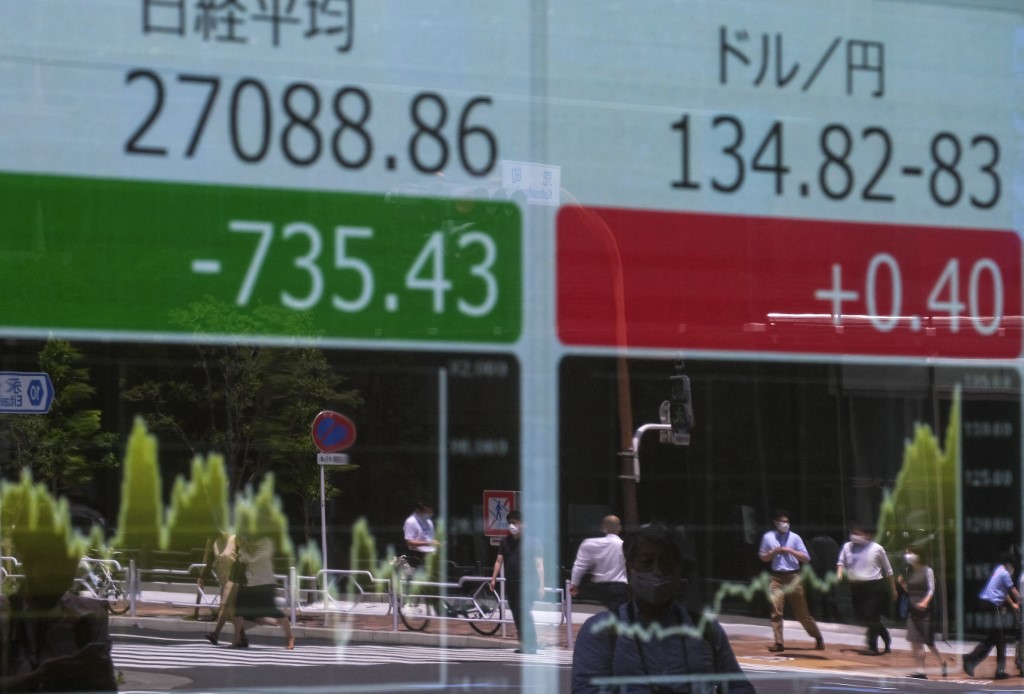
HONG KONG, China (AFP) — Asian markets mostly fell Friday after another hefty drop in New York as central bank interest rate hikes fan fears of a recession, while the yen sank after the Bank of Japan said it would not yet follow its global peers in tightening policy.
Gone is the optimism that flowed through trading floors immediately after the Federal Reserve on Wednesday announced its biggest rate increase for 28 years as global finance chiefs followed suit, putting a squeeze on dealers’ ability to borrow.
Markets have been tumbling for months as traders contemplate the end of the era of cheap cash that sent valuations to record or multi-year highs, with inflation at levels not seen in decades owing to a surge in energy and food prices.
The Bank of England on Thursday lifted rates for a fifth straight time to their highest since 2009 during the financial crisis, just as the Swiss central bank shocked markets by unveiling its own half-point increase — its first rise in 15 years.
The European Central Bank has also signalled it will announce a hike soon.
Equities plunged as expectations for recession continue to rise. The Dow ended below 30,000 for the first time in more than a year and the S&P 500 is now at its lowest since December 2020.
But with rates rising everywhere else, the Bank of Japan on Friday refused to move away from its ultra-loose monetary policy, despite inflation spiking and the yen sitting around a 24-year low.
Officials in Tokyo insist that low rates are still needed to nurture a struggling economy, though in a move away from its regular remarks in the post-meeting statement, the bank did say it “was necessary to pay due attention to developments in financial and foreign exchange markets”.
The yen tumbled to 134.63 against the dollar, from 133.37 before the decision, though it recouped some of those losses after the statement. Still, it is wallowing around a 24-year low and has lost around 13 percent this year.
But Stephen Innes at SPI Asset Management said: “No central bankers worth their weight would put inflation-fighting credentials on the line and import higher energy inflation via a weaker currency.”
He added that “in what is a highly ominous signal for stock market investors, given the broader index’s sensitivity to rising bond yields… the global race to hike rates is nowhere near the finishing line”.
On equity markets, Tokyo, Shanghai, Sydney, Seoul, Singapore, Wellington, Taipei, Bangkok, Manila and Jakarta were all in the red, though Hong Kong was slightly higher after steep losses on Thursday.
– Key figures at around 0310 GMT –
Tokyo – Nikkei 225: DOWN 2.2 percent at 25,858.50 (break)
Hong Kong – Hang Seng Index: UP 0.5 percent at 20,958.37
Shanghai – Composite: DOWN 0.3 percent at 3,274.38
Dollar/yen: UP at 134.30 yen from 132.14 yen late Thursday
Euro/dollar: DOWN at $1.0527 from $1.0550
Pound/dollar: DOWN at $1.2307 from $1.2350
Euro/pound: UP at 85.54 pence from 85.40 pence
West Texas Intermediate: DOWN 0.5 percent at $117.00
Brent North Sea crude: DOWN 0.4 percent at $119.32 per barrel
New York – Dow: DOWN 2.4 percent at 29,927.07 (close)
London – FTSE 100: DOWN 3.1 percent at 7,044.98 (close)
— Bloomberg News contributed to this story —
© Agence France-Presse






